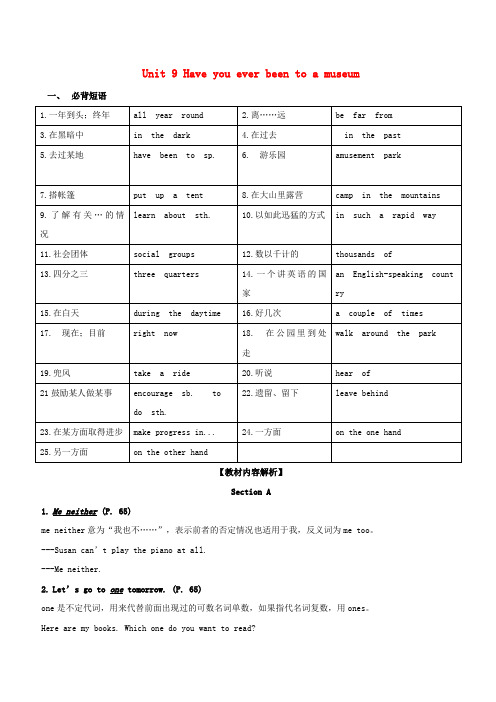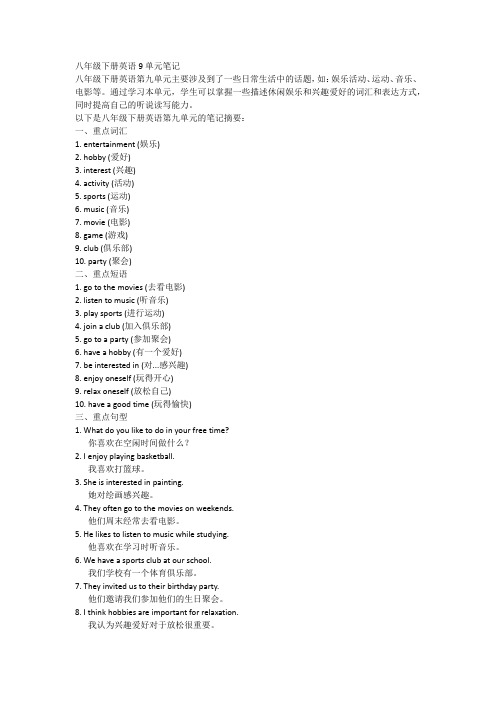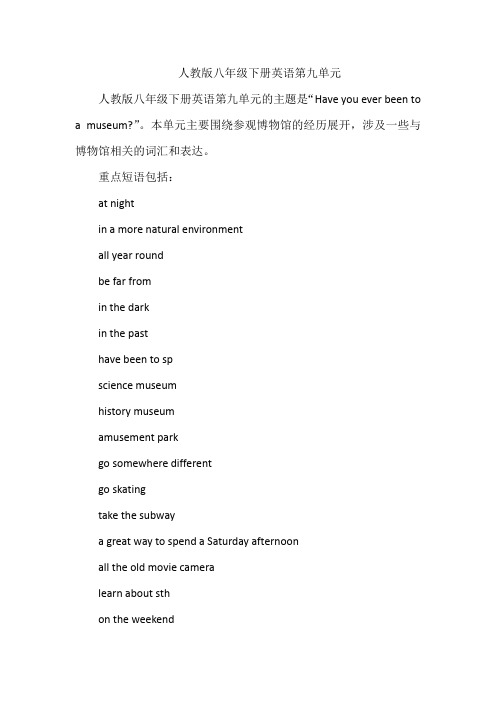八年级下英语第九单元知识点
(人教新目标)八年级英语(下)短语语法知识点汇总Unit9

Unit 9 Have you ever been to a museum 一、必背短语【教材内容解析】Section A1.Me neither (P. 65)me neither意为“我也不……”,表示前者的否定情况也适用于我,反义词为me too。
---Susan can’t play the piano at all.---Me neither.2.Let’s go to one tomorrow. (P. 65)one是不定代词,用来代替前面出现过的可数名词单数,如果指代名词复数,用ones。
Here are my books. Which one do you want to read?---I don’t like these dresses.---How about those ones over there.3.Let’s go somewhere different today. (P. 65)somewhere用作副词,表示“在某处、到某处”,常用于肯定句中,在否定句和疑问句中用anywhere。
It’s cold here. Let’s go somewhere else.Did you go anywhere last Sunday?4.They are going to take the subway. (P. 66)take the subway意为“乘地铁”,take用作动词,可以表示“乘、坐(车、船等)”。
We take the subway to work every day.5.It’s a great way to spend a Saturday afternoon. (P. 66)(1) way表示“方法”时,后常接动词不定式或者of doing作定语。
Can you think out a way to open the door/of opening the door?(2) spend的用法① sb. spend+时间/金钱+on sth. “在某事上花费多长时间或者多少钱”The man spent the whole day on his speech.The family spent 10,000 dollars on their trip.② sb. spend+时间+(in) doing sth. “花费多长时间做某事”The boy has spent two hours playing the computer games.【拓展】辨析spend, pay, take和cost6.We put up a tent and cooked outside. (P. 66)put up意为“搭建”,还可以表示“举起、张贴”。
八年级下册英语9单元笔记

八年级下册英语9单元笔记八年级下册英语第九单元主要涉及到了一些日常生活中的话题,如:娱乐活动、运动、音乐、电影等。
通过学习本单元,学生可以掌握一些描述休闲娱乐和兴趣爱好的词汇和表达方式,同时提高自己的听说读写能力。
以下是八年级下册英语第九单元的笔记摘要:一、重点词汇1. entertainment (娱乐)2. hobby (爱好)3. interest (兴趣)4. activity (活动)5. sports (运动)6. music (音乐)7. movie (电影)8. game (游戏)9. club (俱乐部)10. party (聚会)二、重点短语1. go to the movies (去看电影)2. listen to music (听音乐)3. play sports (进行运动)4. join a club (加入俱乐部)5. go to a party (参加聚会)6. have a hobby (有一个爱好)7. be interested in (对...感兴趣)8. enjoy oneself (玩得开心)9. relax oneself (放松自己)10. have a good time (玩得愉快)三、重点句型1. What do you like to do in your free time?你喜欢在空闲时间做什么?2. I enjoy playing basketball.我喜欢打篮球。
3. She is interested in painting.她对绘画感兴趣。
4. They often go to the movies on weekends.他们周末经常去看电影。
5. He likes to listen to music while studying.他喜欢在学习时听音乐。
6. We have a sports club at our school.我们学校有一个体育俱乐部。
八下英语课文九单元讲解

八下英语课文九单元讲解
八年级下册英语课本九单元的主题是“春天”,这是一个非常适合讨论和学习的主题。
下面是该单元的主要内容:
1. 课文讲解:本单元的课文主要讲述春天的一些特点和活动,包括春天的气候、植物生长、动物活动以及人们在春天进行的活动。
通过学习这篇课文,学生可以了解到春天的各种特点,增强对自然季节变化的认识。
2. 语法点:本单元的语法点是现在进行时,表示正在进行的动作或正在发生的事情。
通过学习这个时态,学生可以更好地理解英语中的时态变化,提高英语表达能力。
3. 词汇和短语:本单元的词汇和短语主要与春天和自然有关,例如“鲜花盛开”、“蝴蝶飞舞”、“放风筝”等。
学生需要掌握这些词汇和短语的拼写、发音和用法,以便在阅读、写作和口语交流中正确使用。
4. 练习和活动:本单元的练习和活动旨在帮助学生巩固所学知识,提高英语应用能力。
学生可以通过完成各种练习和活动,如填空、翻译、写作等,加深对春天和现在进行时的理解,提高英语表达能力。
总之,八年级下册英语课本九单元的主题是春天,通过学习这个单元,学生可以了解春天的特点和活动,掌握现在进行时的用法,提高英语应用能力。
同时,学生也可以更好地理解自然季节的变化,培养对大自然的热爱和尊重。
英语八年级下册第九单元笔记

英语八年级下册第九单元笔记一、重点单词1.proverb: 谚语,固定词组搭配"a proverb say"表示"俗话说"。
2.impolite: 不礼貌的,反义词为"polite"。
3.allow: 允许,后加动词ing形式。
例如:"allow eating"。
4.chat: 聊天,固定词组搭配"have a chat"表示"闲聊"。
5.drop: 掉落,固定词组搭配"drop off"表示"让...下车"。
6.polite: 有礼貌的,反义词为"impolite"。
7.borrow: 借,固定词组搭配"borrow sth from sb"表示"从某人那里借某物"。
8.return: 归还,固定词组搭配"return sth to sb"表示"把某物归还给某人"。
9.invite: 邀请,固定词组搭配"invite sb to do sth"表示"邀请某人做某事"。
10.no problem: 没问题,表示答应对方的请求或要求。
二、重点句子1.It is impolite to point at someone with your finger. 用手指别人是不礼貌的。
2.Do you think so? 你这样认为吗?3.Thank you for allowing me to borrow your book. 谢谢你允许我借你的书。
4.Do you mind if I chat with you for a moment? 我可以和你聊一会儿吗?5.When do you usually drop off your friend? 你通常什么时候让你朋友下车?6.I will return the book to you as soon as possible. 我将尽快把书还给你。
人教版八年级下册英语第九单元

人教版八年级下册英语第九单元人教版八年级下册英语第九单元的主题是“Have you ever been to a museum?”。
本单元主要围绕参观博物馆的经历展开,涉及一些与博物馆相关的词汇和表达。
重点短语包括:at nightin a more natural environmentall year roundbe far fromin the darkin the pasthave been to spscience museumhistory museumamusement parkgo somewhere differentgo skatingtake the subwaya great way to spend a Saturday afternoonall the old movie cameralearn about sthon the weekendcamp in the mountainsput up a tentin such a rapid waydifferent kinds ofdevelopment of toiletssocial groupsthe tea art performancesmake a perfect cup of tea with beautiful tea sets a nice place to enjoy teathousands ofinternational Museum of Toiletsthe Terracotta Armysoutheast Asianight Safarithree quartersan English-speaking countryhave a problem doing sthduring the daytimea couple of timesright nowan amusement park with a special themeWalk around the parkhear oftake a rideanother provincethe Bird’s Nestencourage sb to do sthon the one hand....on the other hand重点句型包括:Have you ever been to a science museum?Grammar Focus 句子1Have you ever visited the space museum?分数词的表达法whether的用法本单元还涉及一些语法知识,如现在完成时、过去进行时、现在进行时、一般过去时等。
八年级下册英语第九单元知识点

八年级下册英语第九单元知识点本单元主要包括词汇、语法和阅读理解等方面的知识,下面将分别对这些知识点进行详细介绍。
一、词汇部分1. 形容词和副词比较级的构成及用法:形容词的比较级通常在词尾加-er,并且可以加上more来表示比较级。
副词的比较级通常在词尾加-er,有些副词需在前面加more来表示比较级。
2. 情态动词的用法:can、could、may、might、must、shall、should、will、would 等情态动词表示能力、许可、可能性、必要性、义务、建议、意愿等。
3. 虚拟语气的用法:虚拟语气用于表示非事实、假设、愿望等,包括条件虚拟句和假设虚拟句。
4. 表示建议和命令的动词短语:suggest、advise、order、request等动词短语可以用来表示建议和命令。
5. 表示数量和程度的词汇:a few、a little、a lot、much、many、few、little、too、very、so等词汇用来表示数量和程度。
6. 介词短语的用法:介词短语用来表示时间、地点、方式、原因等关系。
二、语法部分1. 直接引语和间接引语的转换:直接引语是直接引述别人的话,间接引语是通过陈述来表达别人的话。
2. 定语从句的用法:定语从句用来修饰名词或代词,并且一般用关系代词who、whom、whose、which或关系副词where、when、why引导。
3. He used to和be used to的用法:used to用来表示过去的习惯或经常性动作,be used to表示对某事物习惯或适应。
4. 不定代词的用法:不定代词有somebody、somewhere、something、anybody、anywhere、anything、nobody、nowhere、nothing等。
5. 特殊疑问句的构成及回答方法:特殊疑问句用来询问特定信息,构成为特殊疑问词+一般疑问句。
回答方法可以直接回答或使用肯定/否定的形式回答。
人教版八年级下册英语第九单元知识点归纳总结
Unit9 Haveyoueverbeentoamuseum?一、词汇与短语◆重点单词A 局部1.amusement 消遣;玩耍n. 3.somewhere 在某处;到某处adv. 5.camera 照相机;摄影机;摄像机n. 7.invention 制造;制造物n. 9.invent 制造;制造v.2.social 社会的adj.4.peaceful 和平的;清静的adj. 6.performance 表演;演出n. 8.perfect 完善的;完全的adj. 10.itself (it 的反身代词)它自己pron.11.unbelievable 难以置信的;不真实的adj. 12.collect 收集;采集v.13.progress 进步;进展v.&n. 15.rapid 快速的;快速的adj. 17.unusual 特别的;不寻常的adj. 19.toilet 坐便器;厕所n. 14.theme 主题n.16.ride 供乘骑的游乐设施;短途旅程n. 18.province 省份n.20.encourage 鼓舞v.21.German 德国的;德语的;德国人的adj. 德语;德国人n.B 局部1.thousand 一千num. 3.safe 安全的;无危急的adj. 5.simply 仅仅;只;不过adj. 7.fear 几可怕;惧怕v.&n. 9.Indian 印度的adj. 印度人n. 2.fox 狐狸n.4.equator 赤道n. 6.spring 春天n. 8.mostly 主要地;通常adv. 10.location 地点;位置n.11.whether 不管……(还是);或者……(或者);是否conj. 12.Japanese 日本的;日本人的;日语的adj. 日本人;日语n. 13.whenever 在任何……的时候;无论何时conj.◆重点短语A 局部1.amusementpark 游乐场3.teaart 茶艺5.acoupleof 两个;一对;几个7.ahistorymuseum 历史博物馆9.aspacemuseum 太空博物馆11.anartmuseum 艺术博物馆13.awaterpark 水上公园2.learnabout 了解4.leadto 导致6.campinthemountains 在山中宿营8.putupatent 搭帐篷10.haveinformationabout 有关于……的信息12.progressinsucharapidway 进步如此快速14.acoupleoftimes 几次15.inthefuture 在将来17.haveagreattime 过得开心19.afilmmuseum 电影博物馆16.encouragesb.todosth. 鼓舞某人做某事18.somewheredifferent 某个不同的地方20.theteaartperformance 茶艺表演21.takearideontheboatforseveraldays 乘船旅行几天22.thehistoryanddevelopmentof…................. 的历史和进展B 局部1.allyearround 全年3.alotofthetime 大局部时间5.outsideofChina 在中国以外7.duringthedaytime 在白天9.becloseto 靠近;接近11.choosetodosth. 选择做某事2.thousandsof 数以千计的;许很多多的4.inthedark 在黑暗中6.anEnglish -speakingcountry 一个说英语的国家8.haveproblemsdoingsth. 做某事有困难10.thebesttimetodosth. 做某事的最好时间12.befarfrom 远离13.threequartersofthepopulation 人口的四分之三14.ontheonehand ……ontheotherhand ……一方面……另一方面……◆重点句子A 局部1.—Have youever beento thespacemuseum? —你曾去过太空博物馆吗?—Yes,Ihave.Howaboutyou? —是的,我去过。
人教版八年级英语下册第九单元重点短语句子作文
Unit 9 Have you ever been to a museum?一、重点短语1. at night在夜晚 2.in a more natural environment 在一个更加自然的环境中3. all year round一年到头;终年 3. be far from 离……远4.not too far from sp 距离某地不太远5..in the dark 在黑暗中6.. in the past 在过去7.. have been to sp. 去过某地8.. science museum 科学博物馆9. history museum 历史博物馆10.. amusement park 游乐园11.. go somewhere different 去不同的地方12.. go skating 去滑冰13. take the subway 坐地铁14.a great way to spend a Saturdayafternoon一个过周六下午的好方法15. all the old movie cameras所有的古老的电影摄影机16.. learn about sth.解有关….的情况17. on the weekend 在周末18. the Terracotta Army 兵马俑19. lead sb. to do sth.引导某人做某事20. in Southeast Asia在东南亚21.lead to 导致;产生22.take a holiday 度假23.. camp in the mountains24.. Night Safari 夜间动物园在大山里露营25.. more than three quarters of the population 超过四分之三的人口26.. put up a tent搭帐篷27. in such a rapid way 28. an English-speaking country以如此迅猛的方式一个讲英语的国家29.an unusual museum a good place to practice your 一个不寻常的博物馆30.. different kinds of各种各样的一个练习你的英语的好地方31. so many different kinds of toilets .如此不同种类的坐便器32. have problem doing sth.做某事很困难33.development of toilets 厕所的发展34.during the daytime在白天35.. social groups 社会团体36.. a couple of times 好几次encourage sb. to do sth 37. It is the best to do sth. 最好做某事鼓励某人做某事38. one great thing about sp is that……关于某地一个不错的事情是… 39.encourage sb in sth.在某方面鼓励某人40.. the tea art performances茶艺表演choose to do sth.选择做某事41.. a relaxing and peaceful place near a lake 一个休闲而安静的地方42.. thousands of 数以千计的43.. walk around the park在公园四处走44.. International Museum of Toilets国际厕所博物馆45. hear of 听说make notes=take notes 做笔记46. make a perfect cup of tea with beautiful 47. take a ride兜风tea sets用漂亮的茶具沏一杯完美的茶48. another province另一个省49.. a nice place to enjoy tea50.. the Bird’s Nest鸟巢一个品茶的好地方51.. on the one hand... on the other hand.52.right now=at the moment立刻;马上一方面,另一方面53.an amusement park with a special二、重点句型theme 一个特别的主题游乐园1. Have you ever been to... ?Have you ever been to a science museum?你曾经去过科学博物馆吗?2. Let’s.……Let’s go somewhere different today.4我们今天去个不同的地方吧。
八年级英语u9知识点
八年级英语u9知识点
八年级英语的Unit 9主要介绍了一些有关于交通出行和交通规则的内容。
这里将会介绍这个单元的主要知识点。
一、交通工具
在这个单元,我们学习了一些不同的交通工具和它们的特点。
例如,汽车、公共汽车、自行车、船和飞机等。
我们需要了解它们的主要结构、基本用途以及输送方式等。
二、方向和位置
当我们询问某个地点的方向或给出某个地方的方向时,我们需要使用卡片词。
例如,在右边,左边,直走,往前,往后等。
我们也学习了一些关于位置的词汇,如前面、后面、中间、旁边和对面等。
三、询问和给出信息
在交通出行中,询问方向、地点和其他相关信息非常重要。
因此,在这个单元,我们学习了一些有关如何有效地进行信息交流
的语言表达方法。
例如,如何向他人提问和回答问题,如何描述
位置,如何提供和请求帮助等。
四、指示词和冠词
在描述交通工具、位置和方向时,我们需要使用指示词和冠词。
这些词语能够帮助我们更清楚地表达意思,如this、that、these、those、a、an和the等。
五、交通规则
学习关于交通规则是出现意外事故和确保人身安全的关键。
在
这个单元里,我们学习了一些常见的交通规则,如穿过马路时如
何确保自己的安全,如何识别交通标记等等。
总结
通过学习这个单元,我们可以更好地了解有关交通出行及其相关信息的表达方法,同时学习了如何提供和请求帮助,如何保障自己的人身安全以及关于交通规则的知识。
这些知识点不仅适用于英语学习,也将对我们的日常生活有所帮助。
英语八年级下册第九单元1a到2d知识点
英语八年级下册第九单元1a到2d知识点本篇文章主要介绍英语八年级下册第九单元1a到2d知识点,涉及词汇、语法、听力和阅读理解等方面。
1. 词汇1a部分为词汇学习环节,主要涉及以下几个方面:1)爱好:例如swimming, watching TV, playing games等;2)活动:例如play basketball, go shopping, watch movies等;3)颜色:例如red, blue, green等;4)事物:例如book, computer, phone等。
2. 语法1a部分还涉及到了一些语法知识,主要包括以下几个方面:1)be动词的用法:例如I am a student. He is a doctor.;2)一般现在时的用法:例如I like swimming. She plays basketball every day.;3)频率副词的用法:例如always, often, sometimes, never等;4)现在进行时的用法:例如I am swimming. She is playing basketball.。
2a部分新增了一些语法知识:1)there is/are的用法:例如There is a book on the desk. There are two books in the bag.;2)数量词的用法:例如a, an, some, any, much, many等。
3. 听力2a和2b部分是听力环节,主要涉及以下几个方面:1)听句子选择正确的图片:例如听到“Mary is playing the guitar.”,选择正确的图片为Mary弹吉他;2)听对话选择正确的答案:例如听到“--What are you going to do this weekend? --I am going camping with my friends.”,选择正确的答案为周末我会和朋友去野营;3)听短文回答问题:例如听到一篇有关学生爱好的短文,回答问题“Tom likes playing basketball. True or false?”等。
- 1、下载文档前请自行甄别文档内容的完整性,平台不提供额外的编辑、内容补充、找答案等附加服务。
- 2、"仅部分预览"的文档,不可在线预览部分如存在完整性等问题,可反馈申请退款(可完整预览的文档不适用该条件!)。
- 3、如文档侵犯您的权益,请联系客服反馈,我们会尽快为您处理(人工客服工作时间:9:00-18:30)。
1.in a more natural environment在一个更加自然的环境中2.all year round一年到头;终年3.be far from 离……远4.in the dark 在黑暗中5.in the past 在过去6.have been to sp、去过某地7.science museum 科学博物馆8.history museum 历史博物馆9.amusement park 游乐园10.go somewhere different 去不同的地方11.go skating 去滑冰12.take the subway 坐地铁13.a great way to spend a Saturday afternoon一个过周六下午的好方法14.all the old movie cameras所有的古老的电影摄影机15.learn about sth、解有关。
的情况16.on the weekend 在周末17.camp in the mountains 在大山里露营18.put up a tent搭帐篷19.in such a rapid way 以如此迅猛的方式20.different kinds of各种各样的21.development of toilets 厕所的发展22.social groups 社会团体23.the tea art performances茶艺表演24.make a perfect cup of tea with beautiful tea sets用漂亮的茶具沏一杯完美的茶25.a nice place to enjoy tea 一个品茶的好地方26.thousands of 数以千计的27.International Museum of Toilets国际厕所博物馆28.the Terracotta Army 兵马俑29.Southeast Asia东南亚30.Night Safari 夜间动物园31.three quarters 四分之三32.an English-speaking country一个讲英语的国家33.have problem doing sth、做某事很困难34.during the daytime在白天35.a couple of times 好几次36.right now 现在;目前37.an amusement park with a special theme一个有特别的主题的游乐园38.walk around the park 在公园里到处走39.hear of 听说40.take a ride兜风41.another province另一个省鸟巢42.the Bird’s Nest43.encourage sb、to do sth、鼓励某人做某事44.on the one hand、、、on the other hand、一方面,另一方面45.space museum 太空博物馆46.amusement park 游乐园47.water park 水上公园48.on board 在船上49.end up 结束50.all year round 全年51.tour guide 导游52.flight attendant 空中乘务员53.three times 三次54.at that time 在那时55.in time 及时56.on time 按时57.all the time 一直58.more than = over 超过59.wake up 叫醒60.during the daytime 在白天61.roller coaster 过山车62.hear of 听说hear form 收到…、来信63.around the world =all over the world 全世界64.all the time 一直65.argue with sb 与某人吵架66.in fact 实际上,用在句首for example 例如67.all over 遍及,到处all over the world 全世界all over China 全中国68.English-speaking country 说英语的国家1、Have you ever been to、、、?Have you ever been to a science museum?您曾经去过科学博物馆不?、2、Let’sLet’s go somewhere different today、我们今天去个不同的地方吧。
\~adj、+that、、、3、It’s~It’s unbelievable that technology has progressed insuch a rapid way!科技以如此迅猛的方式发展真就是令人难以置信啊!4、Whether、、、, you’11、、、Whether you like Indian food,Western food orJapanese food, you’ll find it all in Singapore!不管您喜欢印度食品、西方食品还就是日本食品,在新加坡您都能找到!5、One great thing、、is that、、One great thing about Singapore is that the temperature is almost the sameall year round、新加坡一个很大的特征就是它的气温几乎一年到头都就是一样的。
It is best to do sth、、It is best to visit Singapore、、、最好……游览新加坡。
take the subway = by subway 乘地铁(take +the,a +交通工具;by+交通工具) He takes the subway to school 、= He goes to school by subway 、me too 我也就是me neither 我也没…、I have been to the zoo several times 、----me, too 、I’ve never been to a water park 、----me neither 、neither …、、、nor……既不…、、也不……Neither you nor he likes swimming 、neither:两者都不,谓语动词用单数Neither of us has been to Beijing 、three quarters 四分之三基数词+序数词: one third 1/3 two thirds 2/3 three fourths 3/4 One third of the water is dirty 、Two thirds of the students are boys 、see sb do sth 瞧见某人做某事(全过程)I saw lintao enter the office 、see sb doing sth 瞧见某人正在做某事(瞬间动作)when I came here , I saw Lily drawing a picture 、discover 发现已经存在,别人不知道的东西They discovered an oil field 、invent 发明原先没有的东西Who invented the computer ? look for 寻找(强调动作) find 找到(强调结果)What are you looking for ? We found Jim in his uncle’s home 、population :人口多少用large small, 对人口提问用What’s the population of…?have problems in doing sth 做某事很费劲I have problems in learning Math 、sb find it +adj to do sth 某人发觉做某事很……He found it difficult to learn Math well 、她发觉把数学学好很难。
‘Have been to’去过某地已经回来‘have gone to’去某地未回‘Have been in’在某地呆多长时间‘have been +身份’成为什么人多长时间I have been to Singapore before 、I have been in Linyi for 15 yearsI have been a teacher for 8 years 、Where’s Tom ?------He has gone to America 、1、现在完成时A.表示过去发生或已经完成的动作对现在造成的影响或结果,或从过去已经开始,持续到现在的动作或状态。
如:The car has arrived、车子来了。
(结果:车子已在门口)Someone has broken the window、有人把窗户打破了。
(结果:窗户仍破着)现在完成时句子通常有recently,lately,since,for,in the past fewmonths/years等词做时间状语。
肯定形式:have/has +done否定形式:have/has + not+done一般疑问句:have或has放于句首。
B.现在完成时的用法1)现在完成时所表示的动作在说话之前已完成,而对现在有影响。
所以常常后面不用时间状语。
现在完成时所表达的动作离说话人的说话时刻可近可远。
如:He has gone to London、(说话人认为她不在该地)He has been to London、(说话人认为她在该地)2)现在完成时所表示的动作开始于过去,持续到现在,也许还会持续下去。
常用for与since表示一段时间的状语或so far,now,today,this week (month,year)等表示包括现在时间在内的状语。
例如:He has studied English for 5 years、He has studied English since 2001、Now I have finished the work、注意:表示短暂时间动作的词,如:come,go,die,marry,buy等的完成时不能与for,since 等表示一段时间的词连用。
3)现在完成时还可用在时间与条件状语从句中,表示将来某时完成的动作。
例如:I’ll go to your home when I have finished my homework、If it has stopped snowing in the morning,we will go to the park、现在已不在那个地方。
